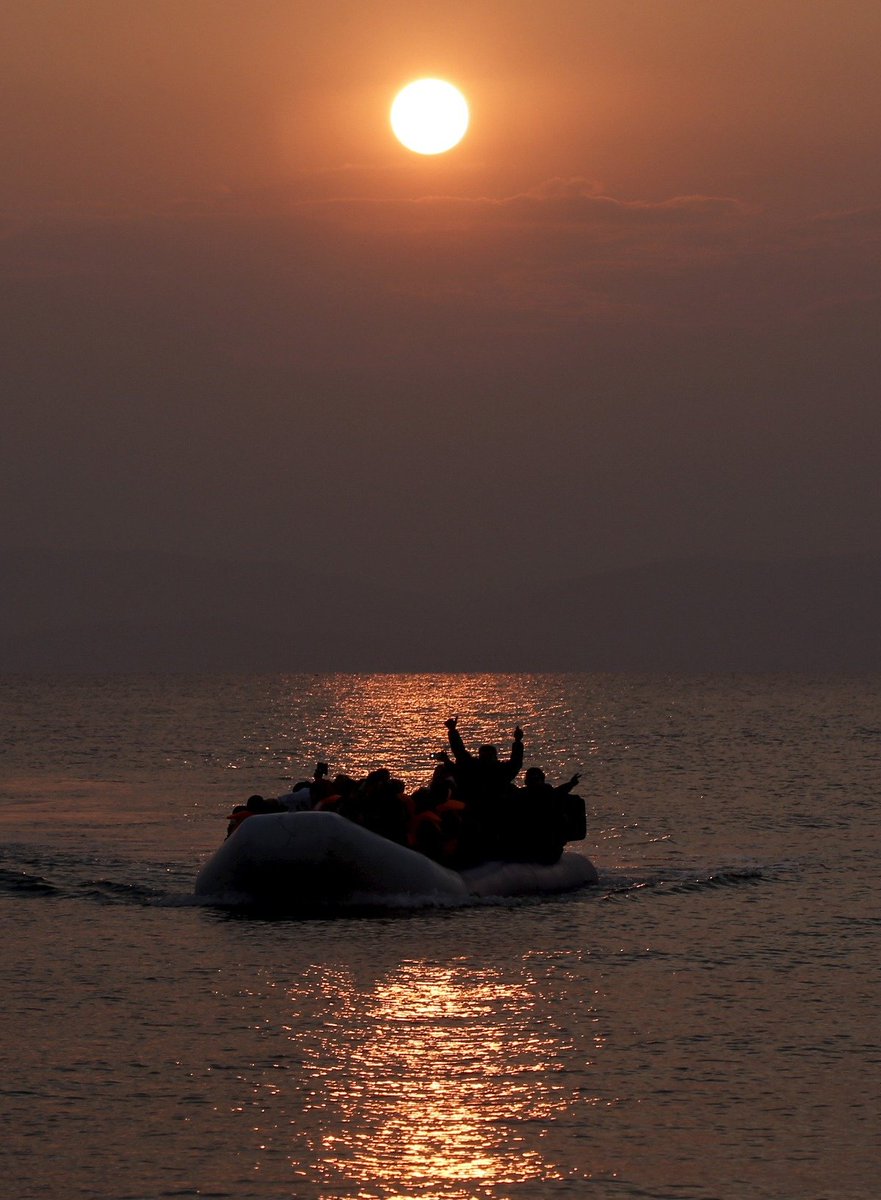
UNHCR warns against refugee returns to Turkey: image via Reuters TV @ReutersTV, 1 April 2016
A shadow of migrants waiting for food in the makeshift refugee camp at the northern Greek border point of Idomeni, Greece: photo by Darko Vojinovic/AP, 31 March 2016
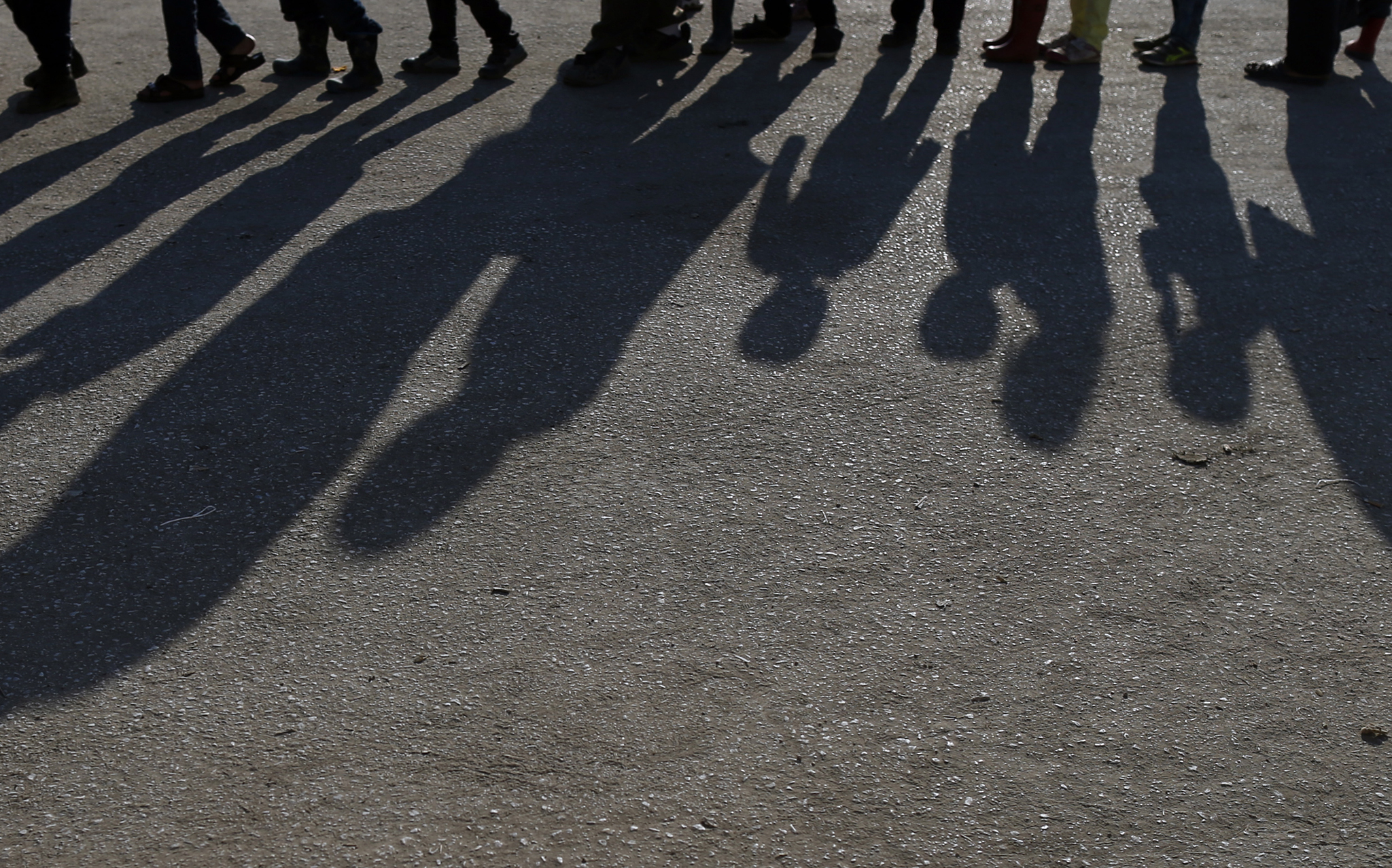
A shadow of migrants waiting for food in the makeshift refugee camp at the northern Greek border point of Idomeni, Greece: photo by Darko Vojinovic/AP, 31 March 2016
Macedonian Army soldiers patrol between the two-line fence set along the border line between Macedonia and Greece, near southern Macedonian town of Gevgelija: photo by Boris Grdanoski/AP, 31 March 2016
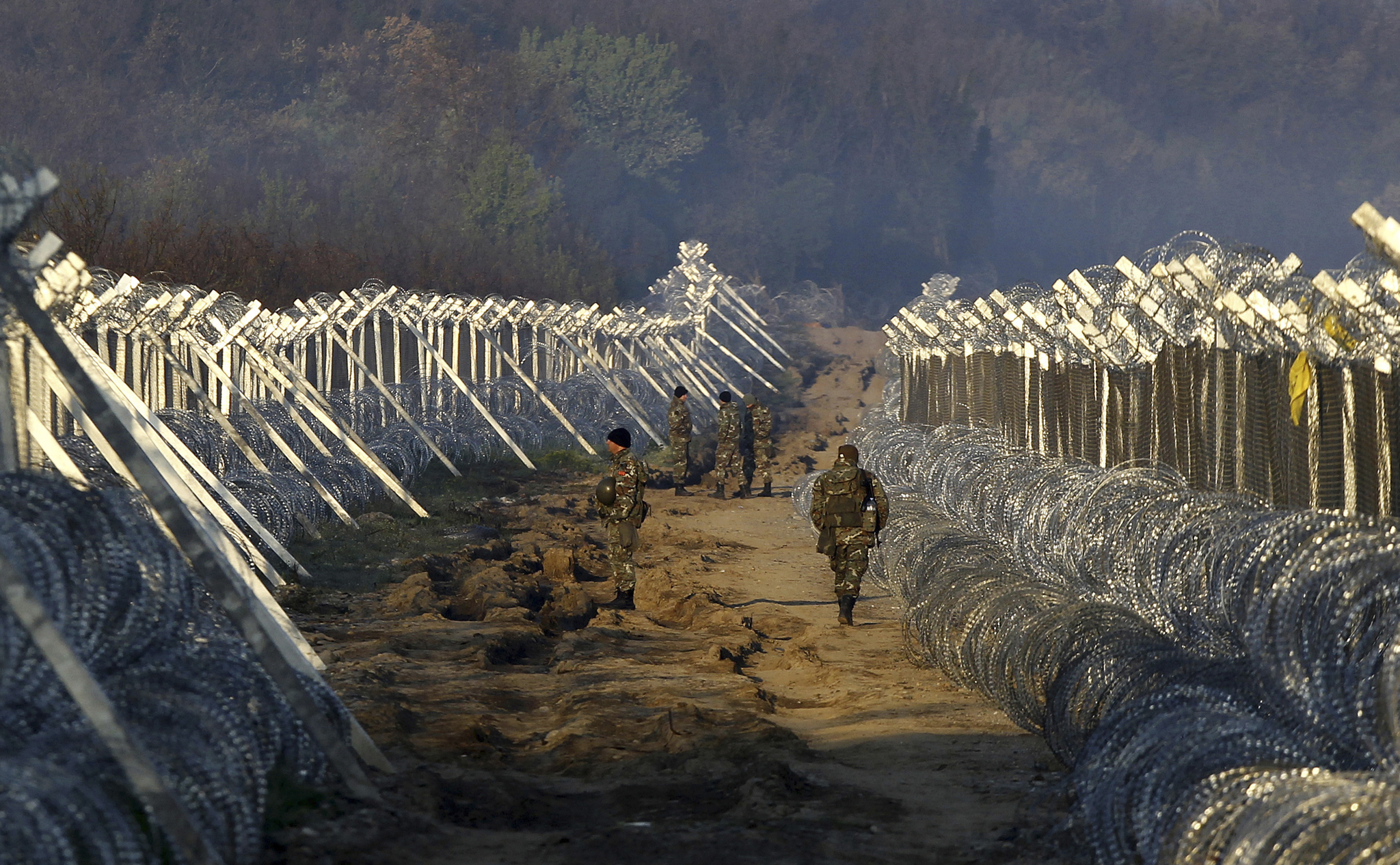
Macedonian Army soldiers patrol between the two-line fence set along the border line between Macedonia and Greece, near southern Macedonian town of Gevgelija: photo by Boris Grdanoski/AP, 31 March 2016

Migrants and refugees wait in the line for food distribution in the makeshift camp at the Greek-Macedonian border, near the Greek village of Idomeni: photo by Bulent Kilic / AFP, 31 March 2016

Migrants stranded in Greece, along with human rights activists and students, shout during a protest against recent border closures across the Balkans: photo by Alkis Konstantinidis / Reuters, 31 March 2016
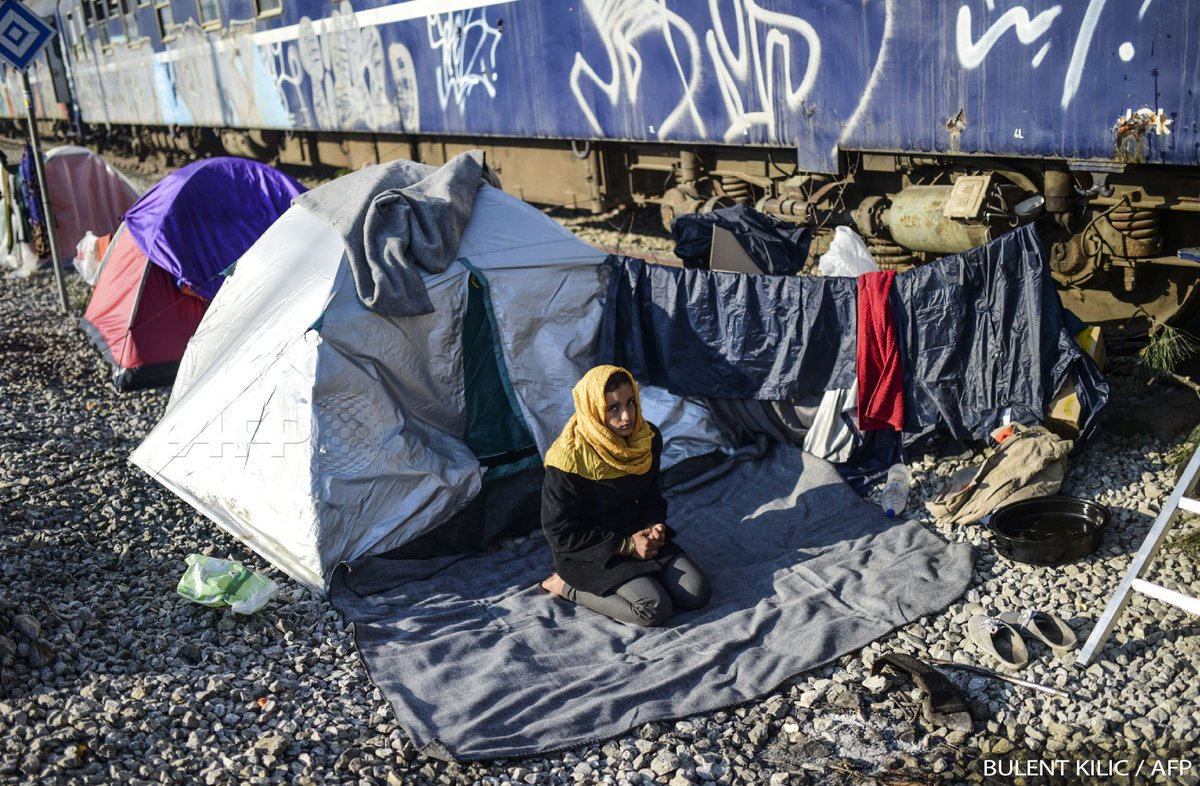
A woman refugee sits in the makeshift camp at the Greek-Macedonian border, near Idomeni I By @Kilicbil #AFP: image via AFP Photo Department @AFPphoto, 31 March 2016
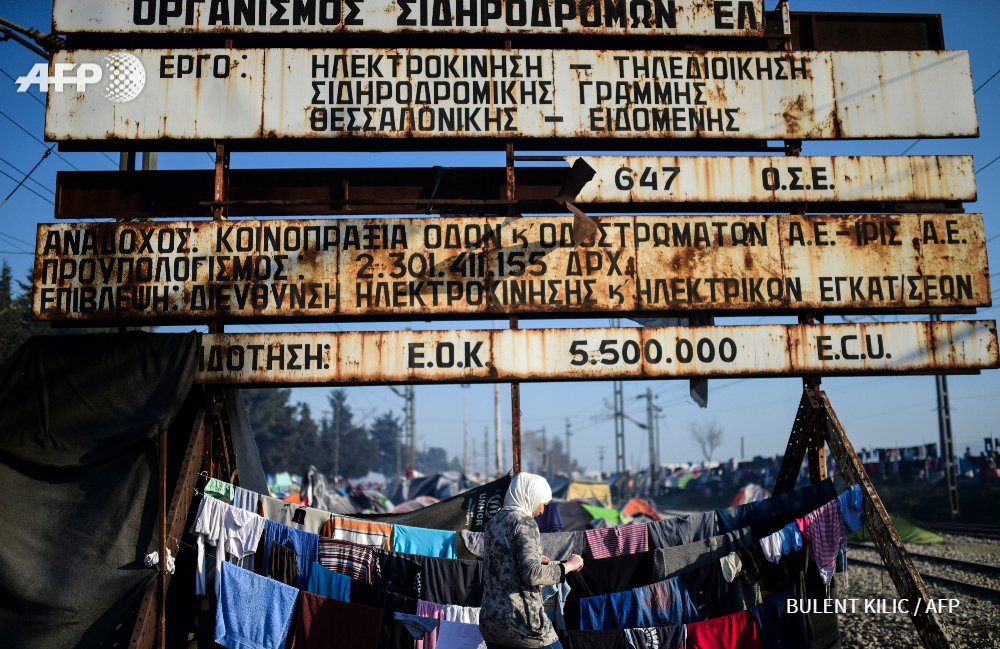
#instantané Une femme sèche du linge dans le camp de migrants d'Idomeni. Photo par @Kilicbil #AFP: image via Agence France-Presse @afpfr, 31 March 2016
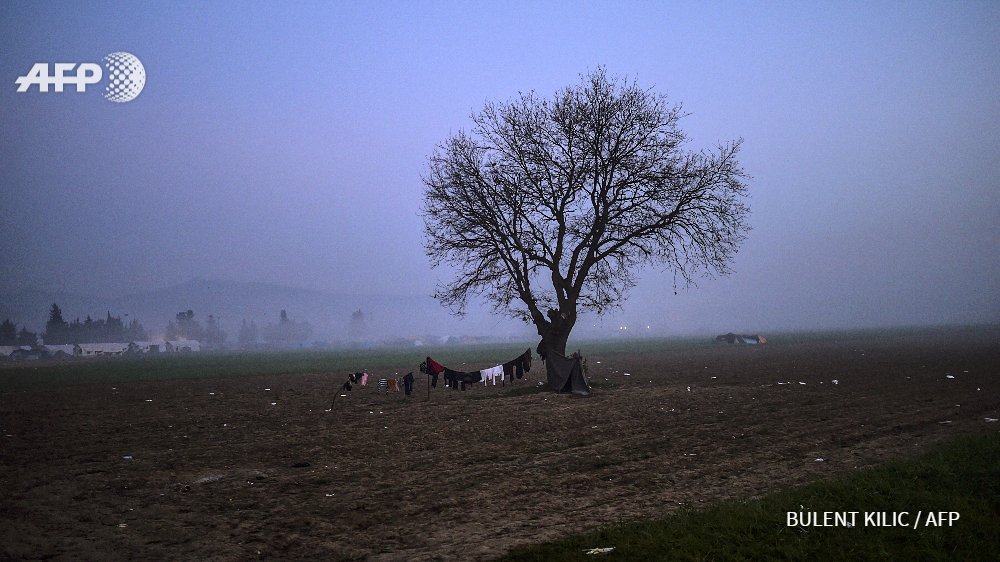
Extraña soledad en Idomeni #DiaenImagenes por @Kilicbil #AFP: image via Agence France-Presse @afpespanol, 1 April 2016
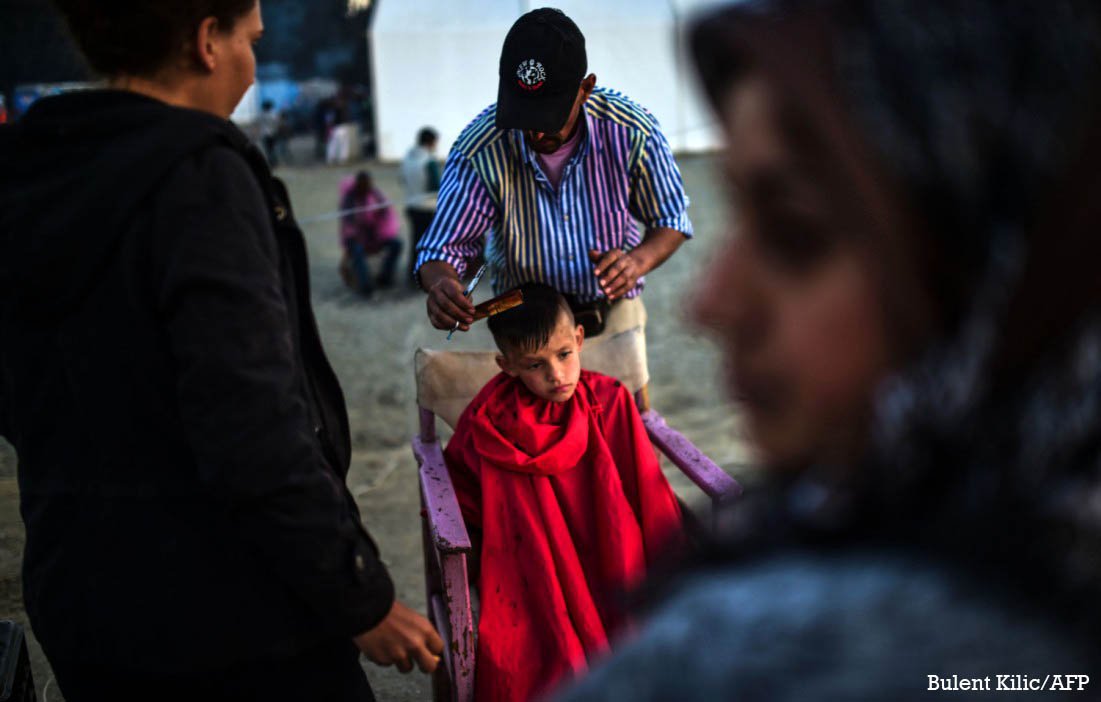
A man cuts a boy's hair at a makeshift camp near #Idomeni on the #Greece #Macedonia border photo @Kilicbil @AFPphoto: image via SundayTimesPictures @STPictures, 1 April 2016

Today's @Newsweek Big Shot by @Kilicbil: Turkey accused of forcing refugees back to Syria: image via Jen Tse @jentse, 1 April 2016
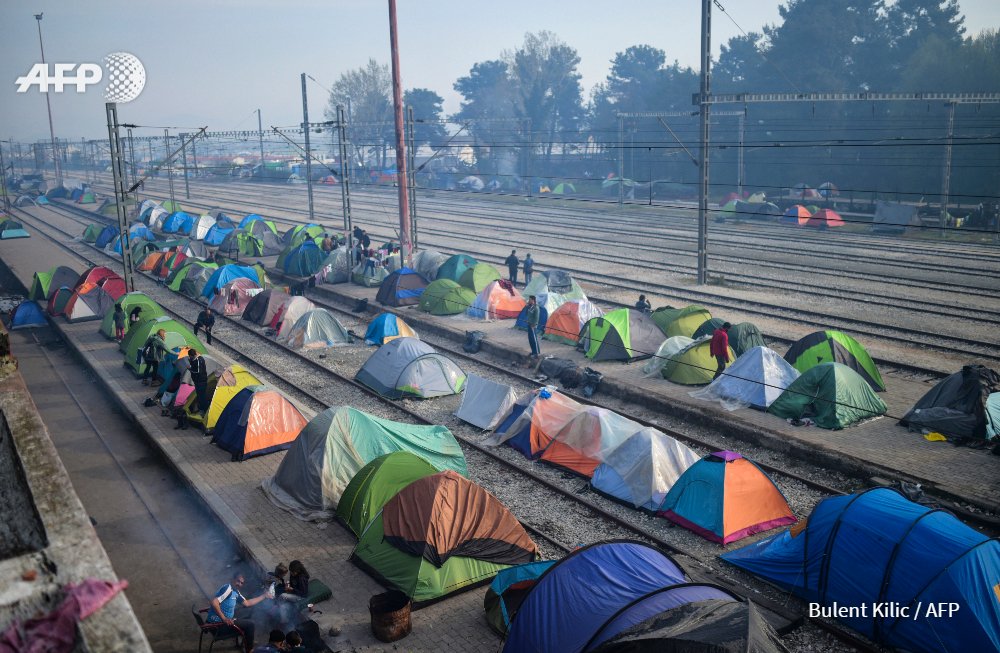
#migrants and #refugees in #Idomeni #Greece today #AFP Photo by @Kilicbil: image via Aurelia BAILLY @AureliaBAILLY, 1 April 2016
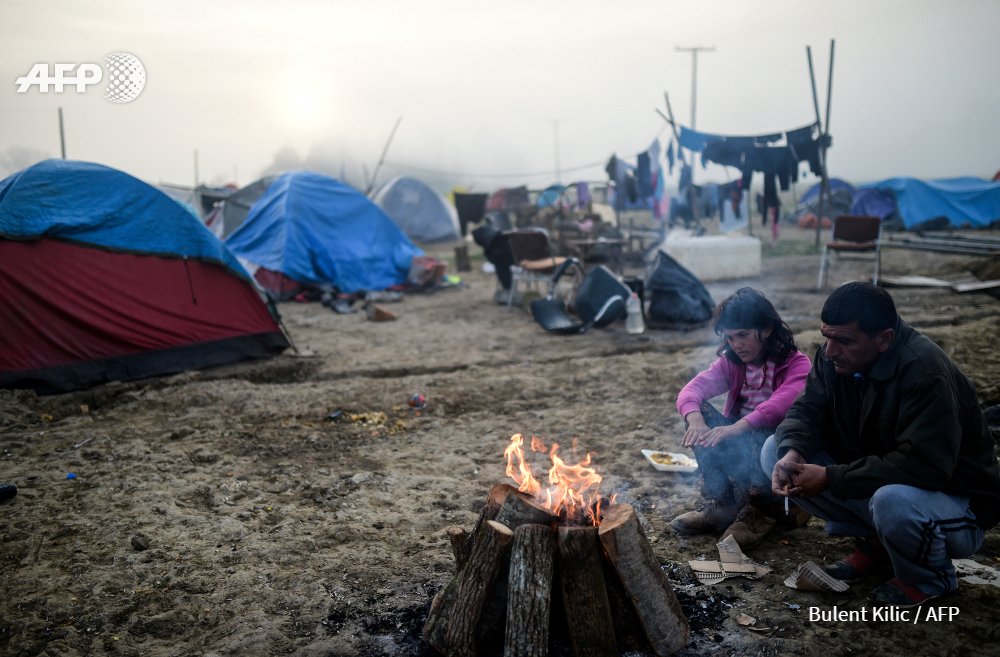
#migrants and #refugees in #Idomeni #Greece today #AFP Photo by @Kilicbil: image via Aurelia BAILLY @AureliaBAILLY, 1 April 2016
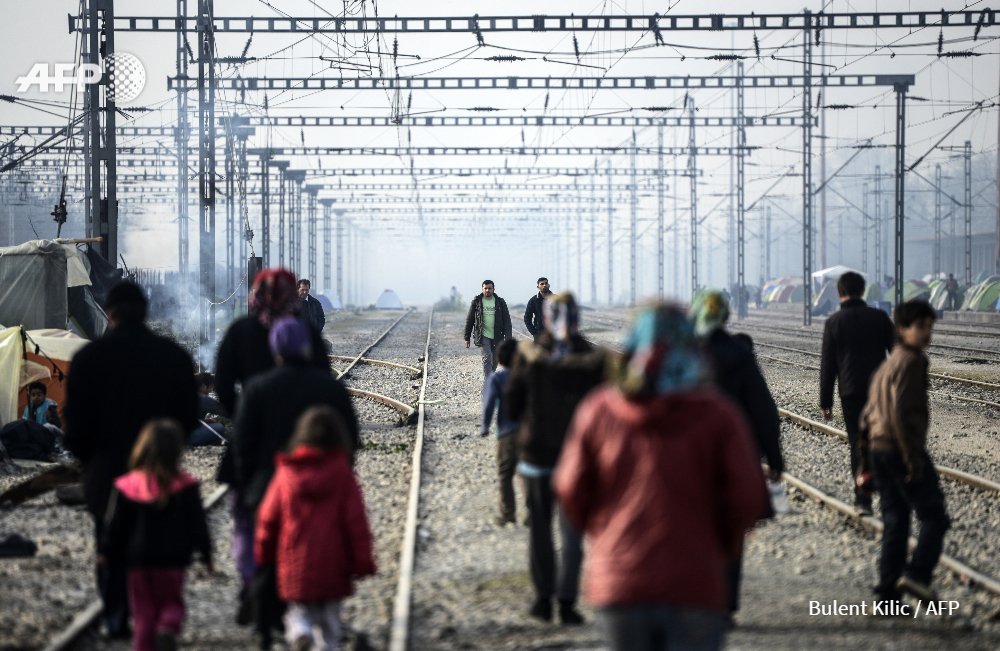
#migrants and #refugees in #Idomeni #Greece today #AFP Photo by @Kilicbil: image via Aurelia BAILLY @AureliaBAILLY, 1 April 2016
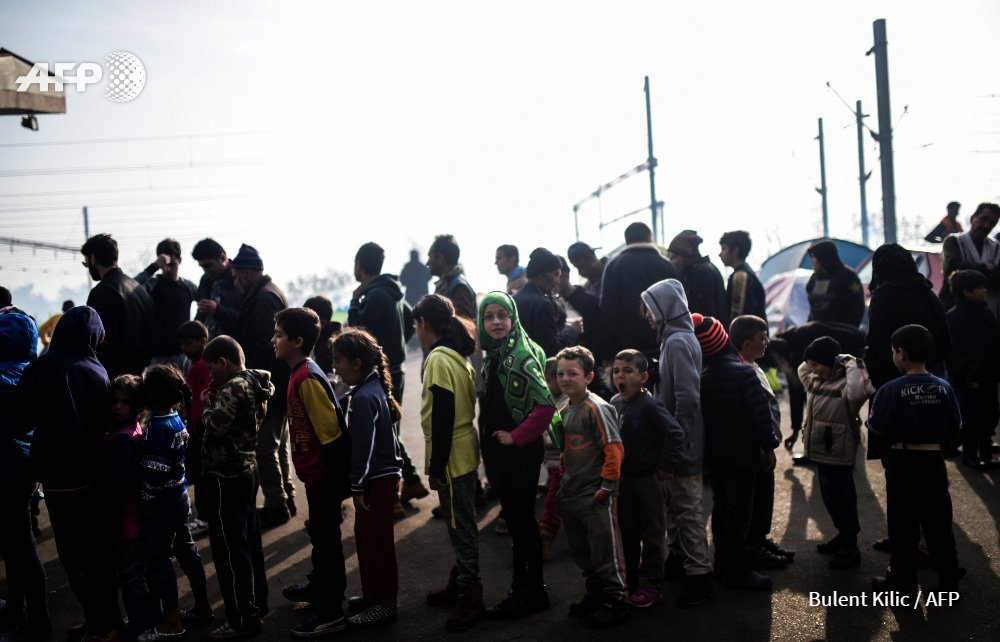
#migrants and #refugees in #Idomeni #Greece today #AFP Photo by @Kilicbil: image via Aurelia BAILLY @AureliaBAILLY, 1 April 2016
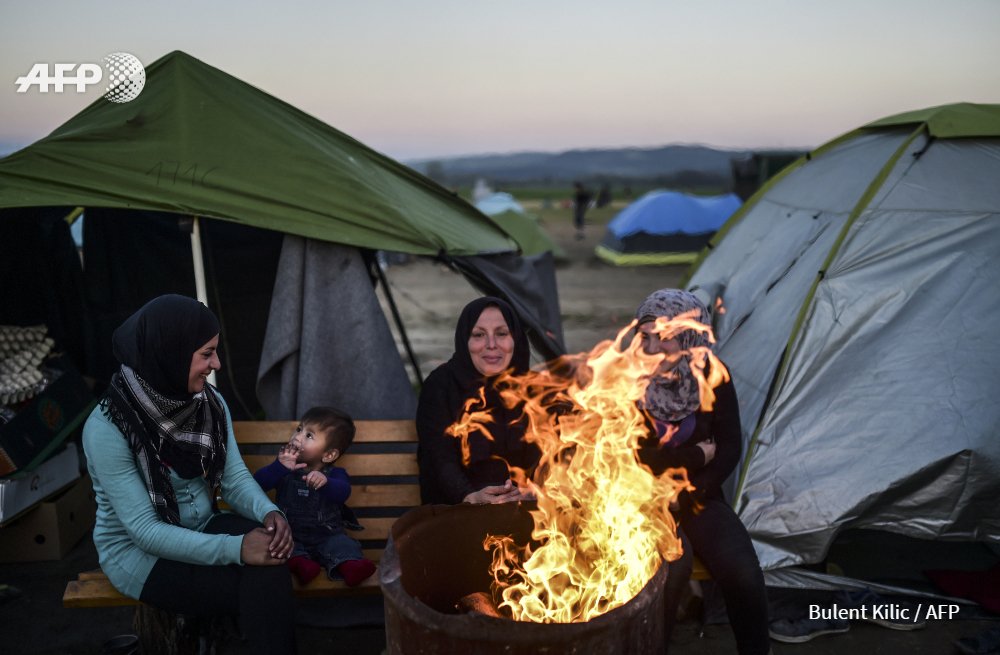
#migrants Syrian refugee women gather around bonfire in #Idomeni #Greece today #AFP Photo by @Kilicbil: image via Aurelia BAILLY @AureliaBAILLY, 1 April 2016
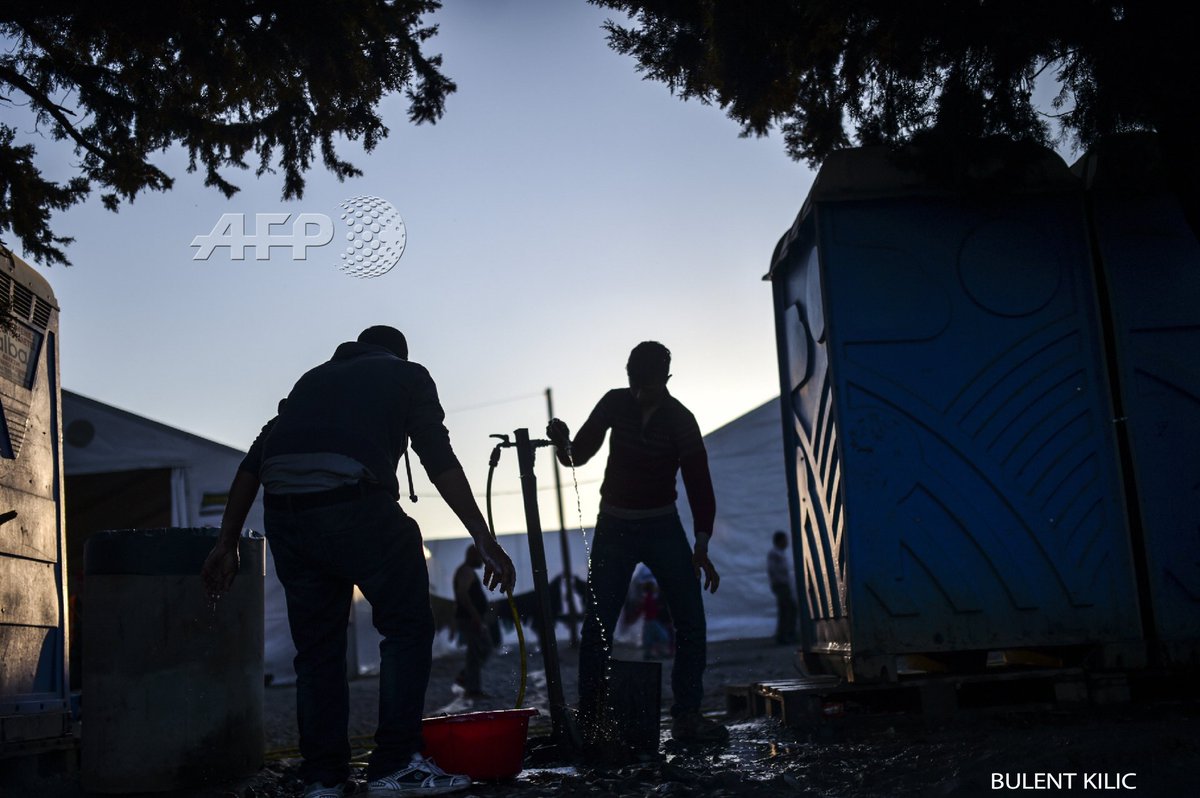
GREECE - Refugees get water at the makeshift camp at the Greek-Macedonian border, near Idomeni I By @Kilicbil #AFP: image via AFP Photo Department @AFPphoto, 31 March 2016
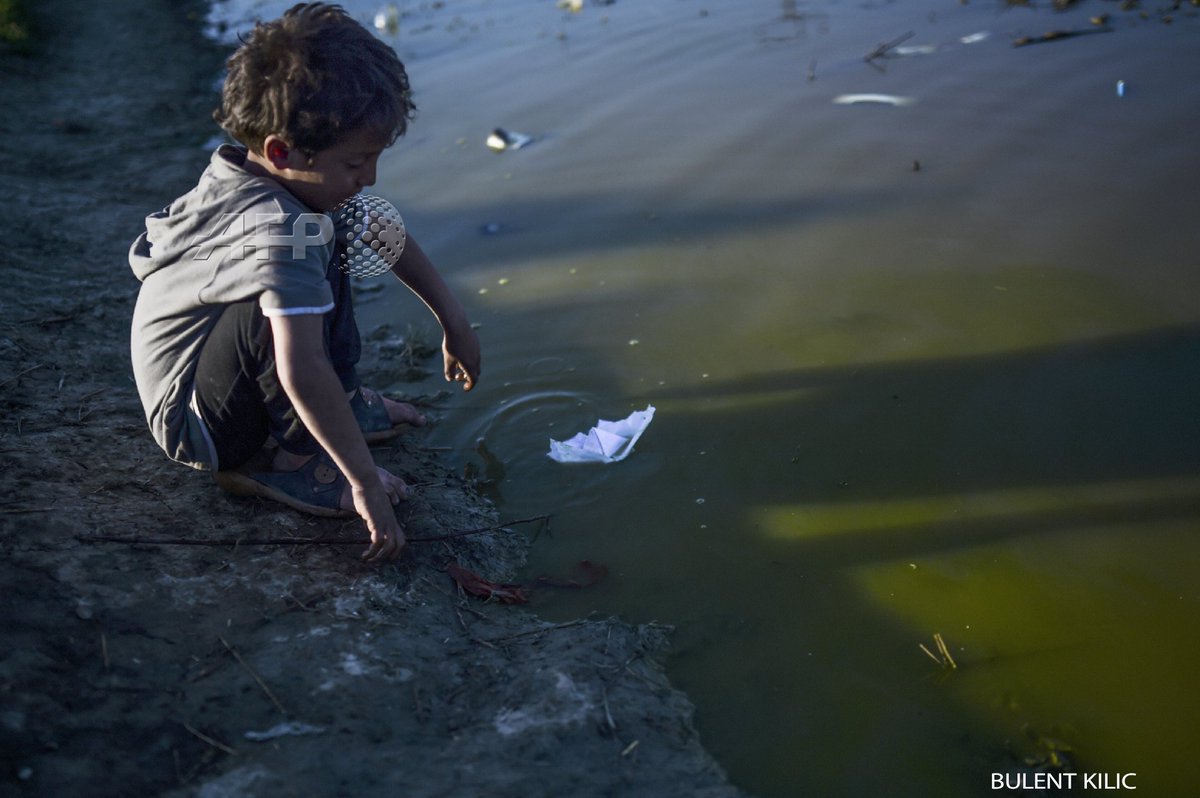
GREECE - A refugee boy plays with a paper boat at the makeshift camp near Idomeni. By @Kilicbil #AFP: image via Frédérique Geffard @fgeffardAFP, 1 April 2016
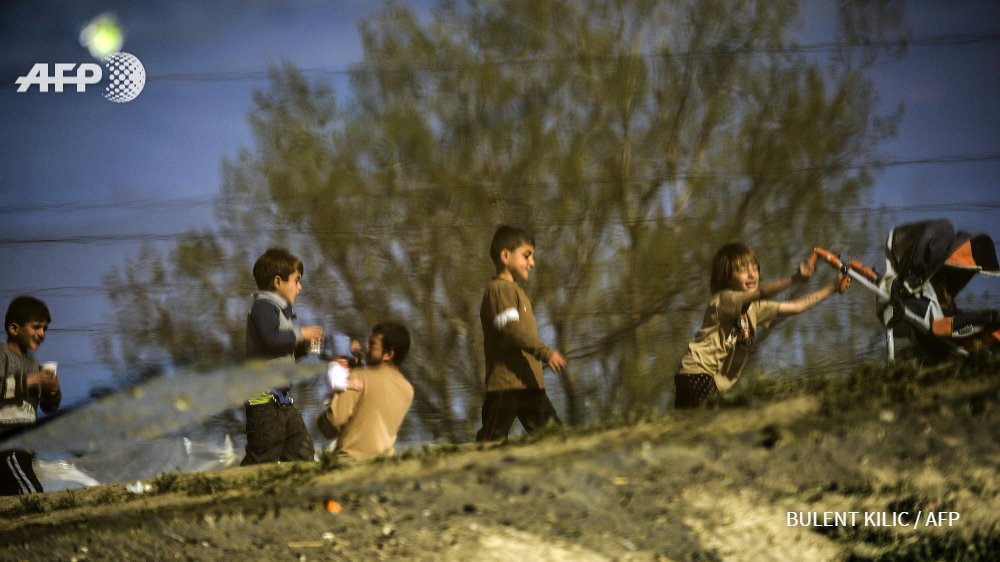
Jugando entre charcos: refugiados pero también niños #Idomeni #DiaenImagenes @Kilicbil #AFP: image via Agence France-Presse @afpespanol, 1 April 2016
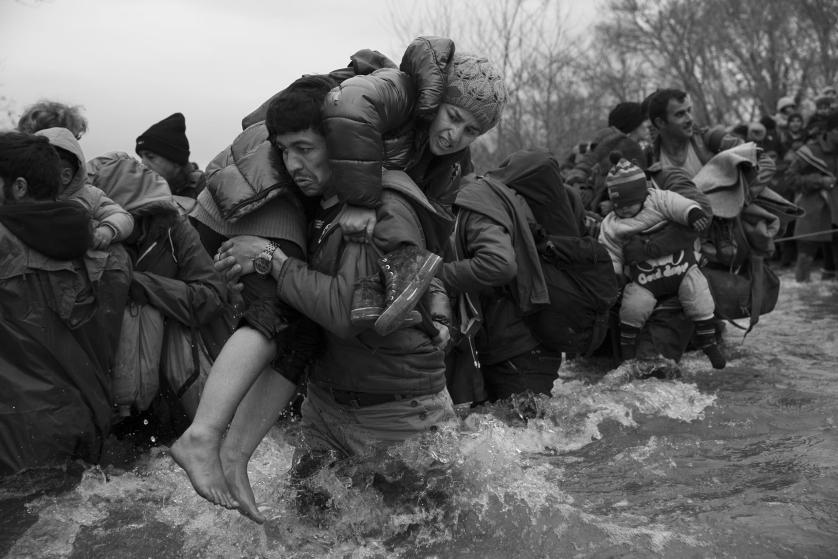
Harrowing #refugeecrisis photos from Idomeni by James Nachtwey @TIME: image via Patrick Witty @patrickwitty, 24 March 2016

An estimated 1,000 migrants made their way from the sprawling camp in Idomeni, Greece and crossed a river near the border in the hopes of crossing into Macedonia on 14 March: photo by James nachtwey for TIME, 24 March 2016

A man prays near the railroad tracks in the Idomeni refugee camp at the
Greece Macedonia border, where thousands of refugees now seek shelter,
as they are unable to make their way further north in Europe: photo by James Nachtwey for TIME, 24 March 2016

A man warms his feet at a sprawling refugee camp along the border of Greece and Macedonia near the town of Idomeni. The refugees are being stopped from moving beyond Greece and have been languishing in the rain, mud, and cold with insufficient food and medical care while sleeping in small tents: photo by James Nachtwey for TIME, 24 March 2016

Refugees seek warmth in a camp at the border of Greece and Macedonia near the town of Idomeni. The path that more than a million asylum seekers had used to reach Germany last year, going from Turkey to Greece and up through the Balkans is no longer possible because of border closures, leaving thousands stranded in Greece: photo by James Nachtwey for TIME, 24 March 2016

Refugees seek warmth in a camp at the border of Greece and Macedonia near the town of Idomeni. The path that more than a million asylum seekers had used to reach Germany last year, going from Turkey to Greece and up through the Balkans is no longer possible because of border closures, leaving thousands stranded in Greece: photo by James Nachtwey for TIME, 24 March 2016

Refugees languish in the rain, mud and cold at the sprawling Idomeni camp on the Greece Macedonia border: photo by James Nachtwey for TIME, 24 March 2016

Refugees languish in the rain, mud and cold at the sprawling Idomeni camp on the Greece Macedonia border: photo by James Nachtwey for TIME, 24 March 2016

Refugees wearing rain gear stand on a food distribution line at refugee camp in Greece, near the border with Macedonia. Under the terms of the Brussels agreement signed March 20, all asylum seekers who reach the Greek islands will be sent back to Turkey. Nations to the north of Greece will keep their borders closed to asylum seekers, guarding them with a system of checkpoints and razor-wire fences.: photo by James Nachtwey for TIME, 24 March 2016

Refugees wearing rain gear stand on a food distribution line at refugee camp in Greece, near the border with Macedonia. Under the terms of the Brussels agreement signed March 20, all asylum seekers who reach the Greek islands will be sent back to Turkey. Nations to the north of Greece will keep their borders closed to asylum seekers, guarding them with a system of checkpoints and razor-wire fences.: photo by James Nachtwey for TIME, 24 March 2016

A man sleeps at a camp for refugees near the border town of Idomeni in Greece. Thousands are stranded in Greece because of border closures in the Balkans.: photo by James Nachtwey for TIME, 24 March 2016

A man sleeps at a camp for refugees near the border town of Idomeni in Greece. Thousands are stranded in Greece because of border closures in the Balkans.: photo by James Nachtwey for TIME, 24 March 2016

Thousands of refugees are stranded in a "no-mans land" camp at the border of Greece and Macedonia near the town of Idomeni. Since it was created around railway tracks last summer, conditions have grown increasingly unlivable, with shortages of food, toilets and health care, as well as beds. The camp’s inhabitants cook their meals over bonfires of plastic and other trash.: photo by James Nachtwey for TIME, 24 March 2016

Thousands of refugees are stranded in a "no-mans land" camp at the border of Greece and Macedonia near the town of Idomeni. Since it was created around railway tracks last summer, conditions have grown increasingly unlivable, with shortages of food, toilets and health care, as well as beds. The camp’s inhabitants cook their meals over bonfires of plastic and other trash.: photo by James Nachtwey for TIME, 24 March 2016

Laundry hangs on a line on 13 March in the sprawling camp for refugees near the village of Idomeni, Greece at the border with Macedonia, where thousands are now stranded unable to make their way north: photo by James Nachtwey for TIME, 24 March 2016

Laundry hangs on a line on 13 March in the sprawling camp for refugees near the village of Idomeni, Greece at the border with Macedonia, where thousands are now stranded unable to make their way north: photo by James Nachtwey for TIME, 24 March 2016

A boy peers out of a tent at a refugee camp in Greece at the Macedonian border, where 12,000 inhabitants -- nearly all of them Syrians, Iraqis or Afghans -- have been huddling in their shelters atop the mud: photo by James Nachtwey for TIME, 24 March 2016

The sprawling camp near Idomeni, Greece which now houses thousands of refugees who have been stopped from moving across the border into Macedonia, in order to make their way further north in Europe. The Idomeni camp is a visible symbol of Europe's inability to cope with the migrant crisis.: photo by James Nachtwey for TIME, 24 March 2016

The sprawling camp near Idomeni, Greece which now houses thousands of refugees who have been stopped from moving across the border into Macedonia, in order to make their way further north in Europe. The Idomeni camp is a visible symbol of Europe's inability to cope with the migrant crisis.: photo by James Nachtwey for TIME, 24 March 2016
Indian rescue workers work on a partially collapsed overpass in Kolkata, India. A long section collapsed, with tons of concrete and steel falling midday traffic, killing several and injuring many.: photo by Bikas Das/AP, 31 March 2016

Rescue workers clear the rubble of a partially collapsed flyover in Kolkata: photo by Bikas Das / AP, 31 March 2016
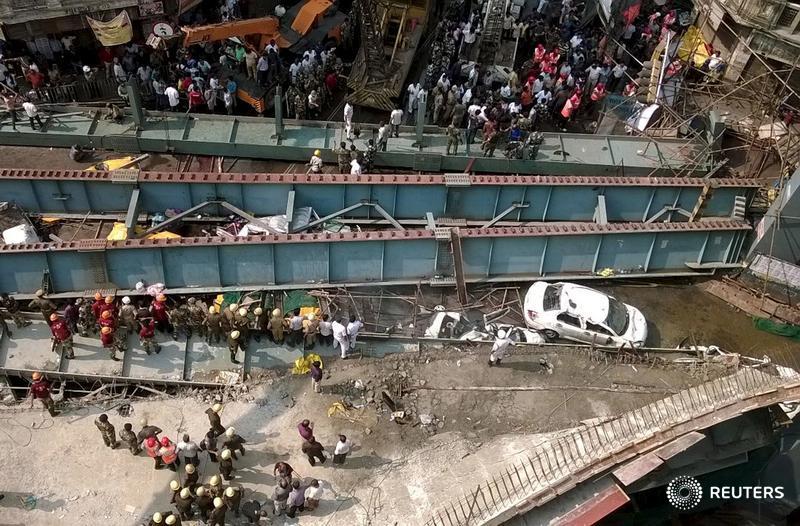
A view of the collapsed flyover in #Kolkata. Reuters pic by Rupak De Chowdhuri.: image via Reuters India @ReutersIndia, 31 March 2016
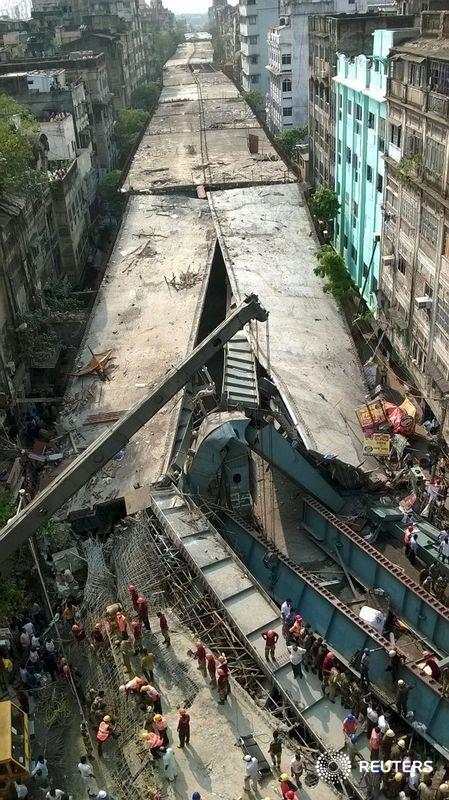
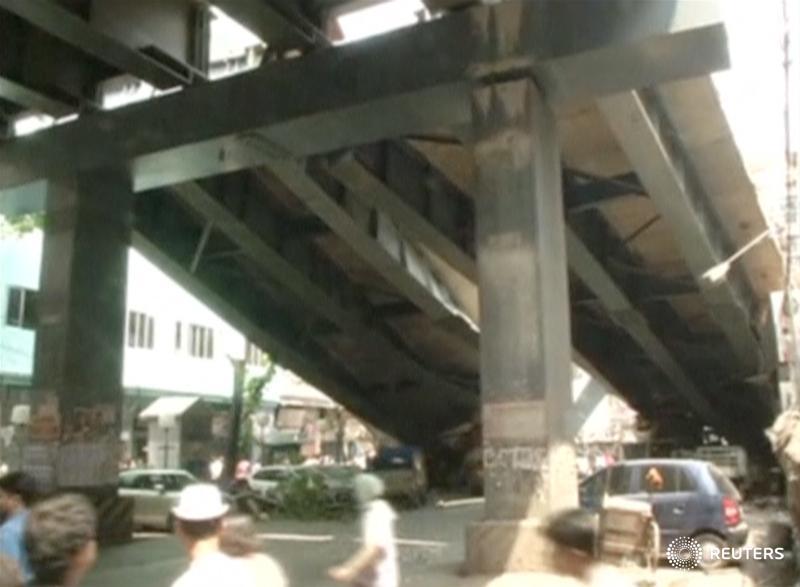
Flyover collapse in Kolkata kills 14; scores feared trapped: image via Reuters India @ReutersIndia, 31 March 2016
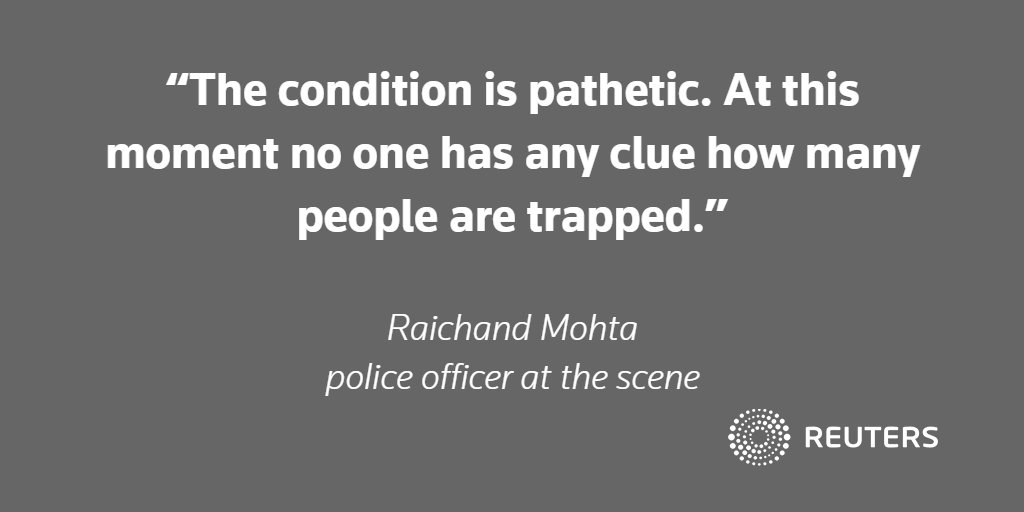
WATCH: Security camera footage ofLatest Reuters update on the #Kolkata flyover collapse: image via Reuters India @ReutersIndia, 31 March
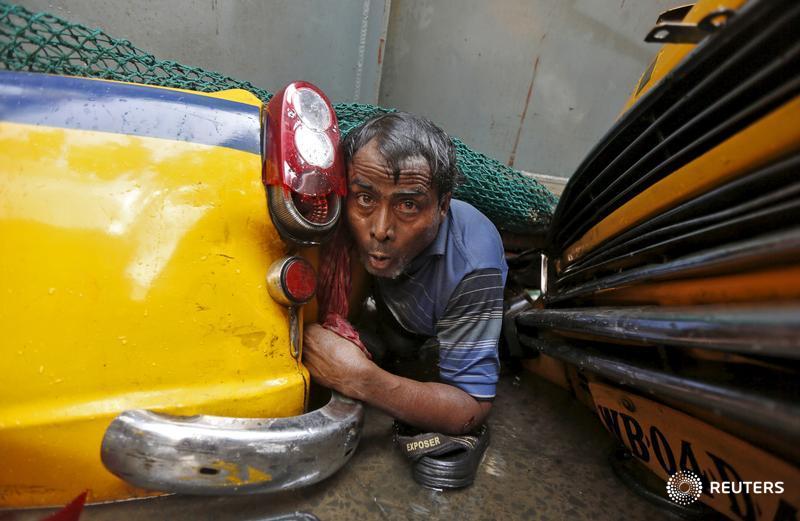
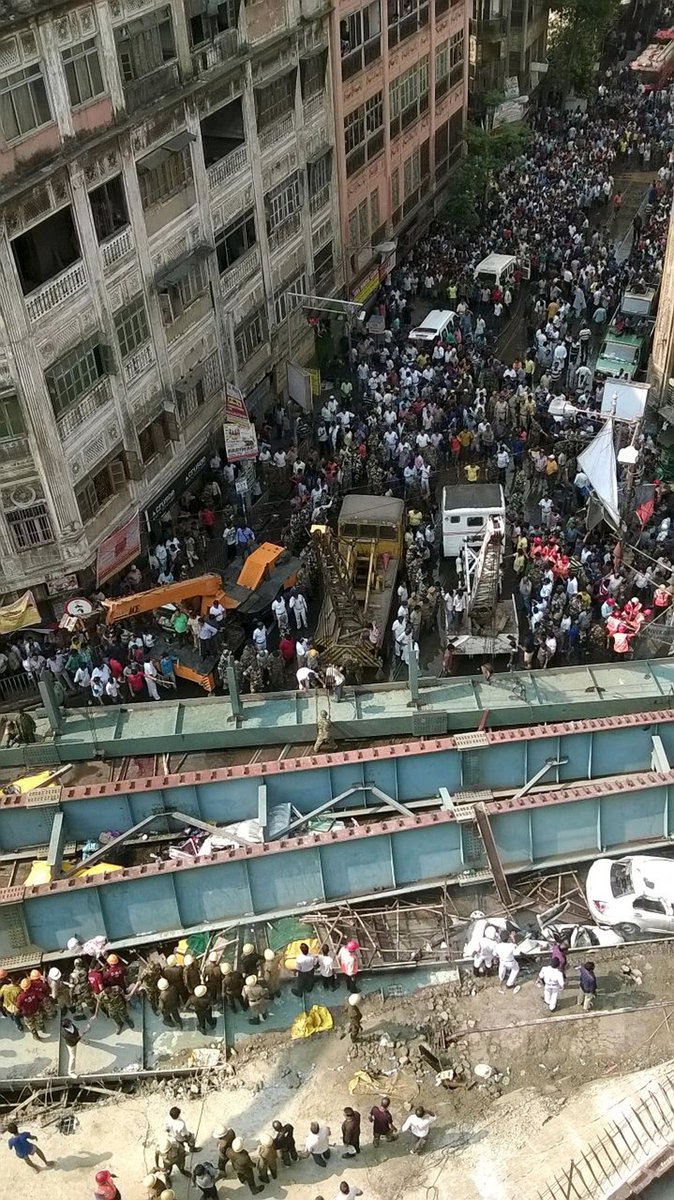
India overpass collapse kills 14; scores feared trapped:: image via Reuters Top News @Reuters, 31 March 2016
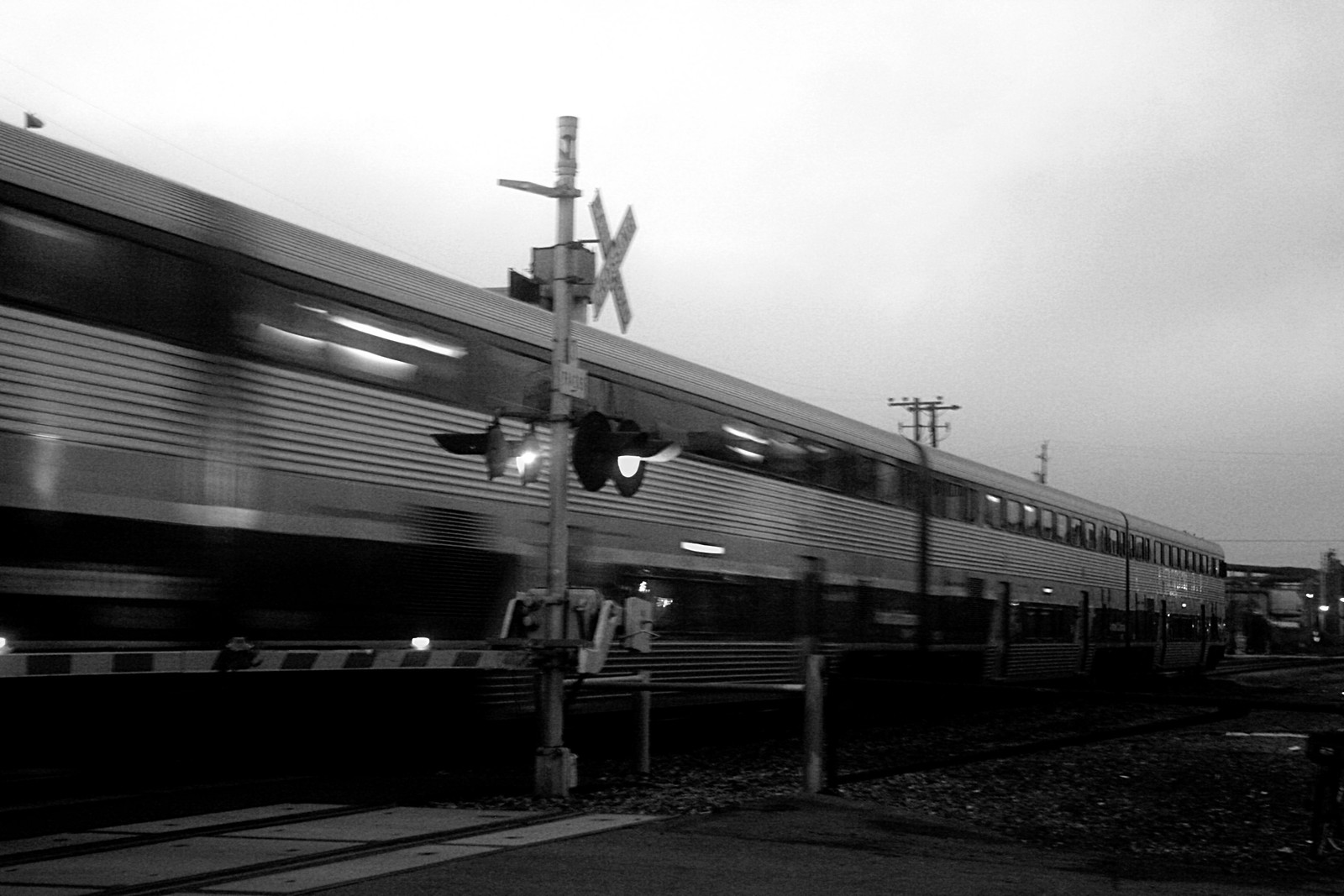
Virginia St. level crossing, Berkeley: photo by TJ Gehling, 10 February 2014
As if unstoppable... Byron the blind guy not getting killed
In a series of impossible miracles managing
Byron (Trials of Transportation)
We crossed paths often in the same late hour
We crossed paths often in the same late hour
At that fearsome death corner on Colusa -- Byron alone
Rigid intent fierce determined tough in all weathers
Independent beyond anybody ever known
Resistant to outside influence other than that of his exacting God
Independent beyond anybody ever known
Resistant to outside influence other than that of his exacting God
Infinitely vulnerable totally blind ever since long ago Bible College
Hermit Byron
Pathetically girded in the night
Hermit Byron
Pathetically girded in the night
For heartstopping expedition down the Ave to Safeway
The Lord's own stifflegged wooden warrior marching ever onward with
Crash helmet kneepads dark goggles in mysterious shadow world
Backpack for groceries long white red-tipped stick
The lance of a Uccello footsoldier
Backpack for groceries long white red-tipped stick
The lance of a Uccello footsoldier
Poking out ahead hesitating
To listen before launching within permanent dark
From tiny traffic island perch mid torrent
Into insane traffic stream crossing without seeing never seeing anything
Since losing his sight completely long long ago
While at Bible College
Furious headlong in purpose as a man possessed by inner vision
Since losing his sight completely long long ago
While at Bible College
Furious headlong in purpose as a man possessed by inner vision
Against the light in face of mad oncoming bumping into curbs into
Parked cars falling getting up undaunted plunging on readjusting course
Inner navigation flaw errant repeated correction path providential
Zigzag
Inner navigation flaw errant repeated correction path providential
Zigzag
Through shapeless yet tangible unknown
Traffic pandemonium
Traffic pandemonium
As if unstoppable... Byron the blind guy not getting killed
In a series of impossible miracles managing
To escape all dangers
Without ever knowing they were there
Rushing directly toward him
Without ever knowing they were there
Rushing directly toward him
At that most lethal corner surviving somehow all these years...
Byron the nocturnal somnambulist
Byron the nocturnal somnambulist
Byron the evangelist
Byron the dogged foe of the forces of atheism in their several guises
Byron the dogged foe of the forces of atheism in their several guises
Byron the hermit Byron the blest interrogator Byron the ever unappeased
Byron the obscure scourge of a crazy grim Lord...
The trials of transportation
For the old are continuous yet variable by degree and for none ever more acute
Than every day for Byron the blind isolato
A walking collection of bruises in boots uncomplaining
...Then
One morning last month at the Gilman Street Amtrak level crossing
Byron marched out onto the tracks toting a trash bag
En route to the recycling center
The trials of transportation
For the old are continuous yet variable by degree and for none ever more acute
Than every day for Byron the blind isolato
A walking collection of bruises in boots uncomplaining
...Then
One morning last month at the Gilman Street Amtrak level crossing
Byron marched out onto the tracks toting a trash bag
En route to the recycling center
Just as a silent-running UP commuter train came along
Oaktown to Sac Martinez Division
And separated Byron from one of his feet...
At Highland they sawed off the rest of the leg and there
At Highland they sawed off the rest of the leg and there
Attended by nobody but the ICU nurses
After two and a half weeks Byron finally slipped
After two and a half weeks Byron finally slipped
Out of the too bright world he couldn't see
Into the permanent darkness he'd always known was out there
But could never see coming

The Blink of an Eye. [Near Gilman St. level crossing, Berkeley.] An Amtrak California train speeds through a signal bridge on the Union Pacific Martinez subdivision.: photo by Matt Blaze, 17 October 2010
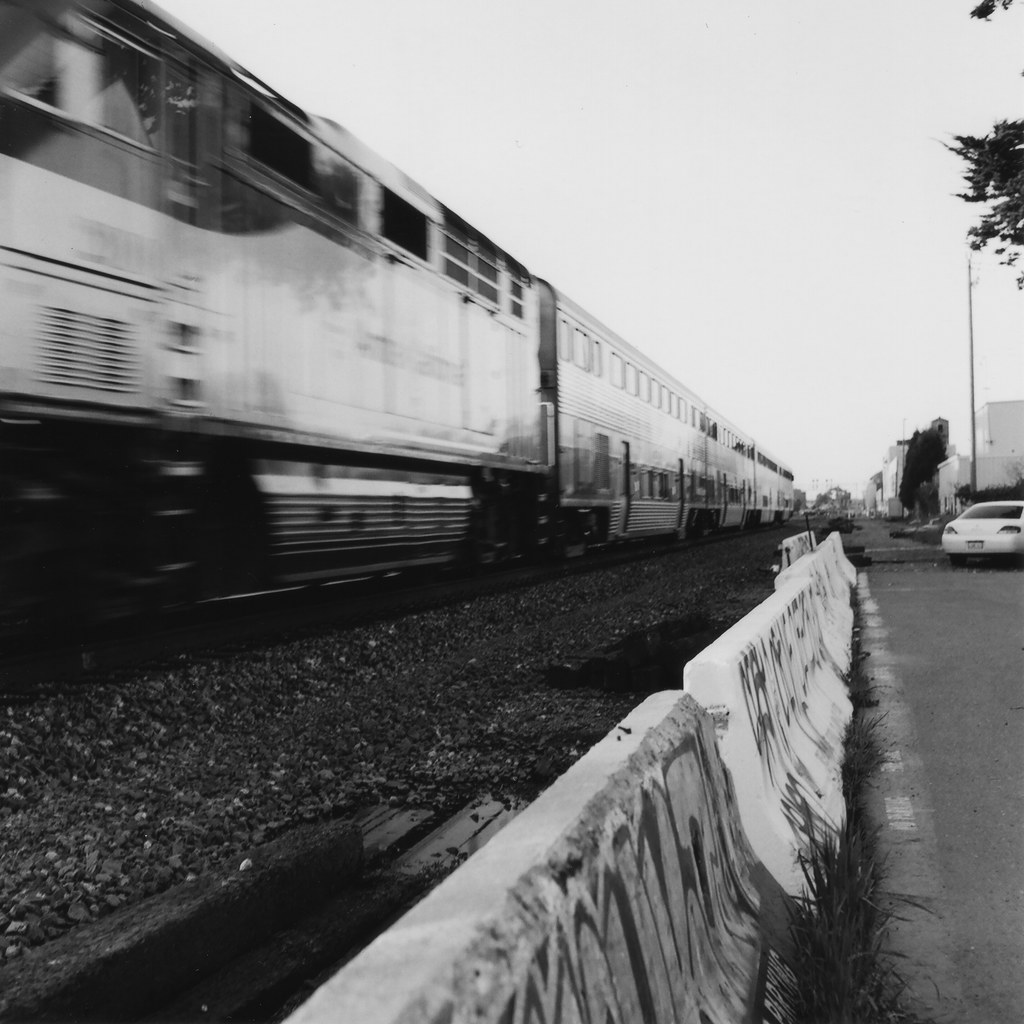
Amtrak train, Berkeley, California: photo by Jeremy Brooks 23 March 2010
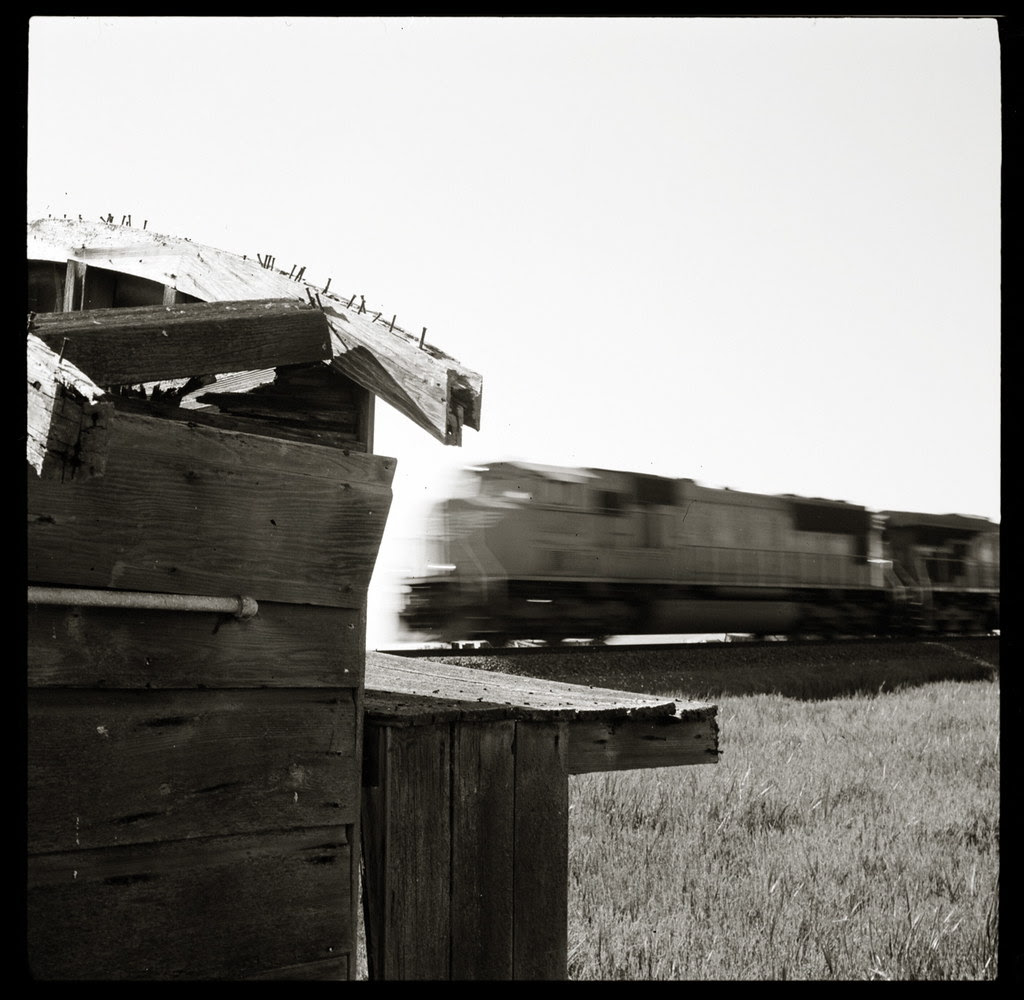
Drawbridge No. 8 (Richmond, California): photo by efo, 27 July 2010

Amtrak train 734 (Pinole, California): photo by efo, 30 April 2006

A man was transported to Highland Hospital after being struck by an Amtrak train on the morning of Tuesday Feb. 23, 2016: photo by Ariel Nava/Berkeleyside, 23 February 2016.

The Gilman Street track crossing was closed to traffic for about one hour on Feb. 23 after a train struck a pedestrian who had trespassed onto the track: photo by peregrinekt @peregrinekt, 23 February 2016
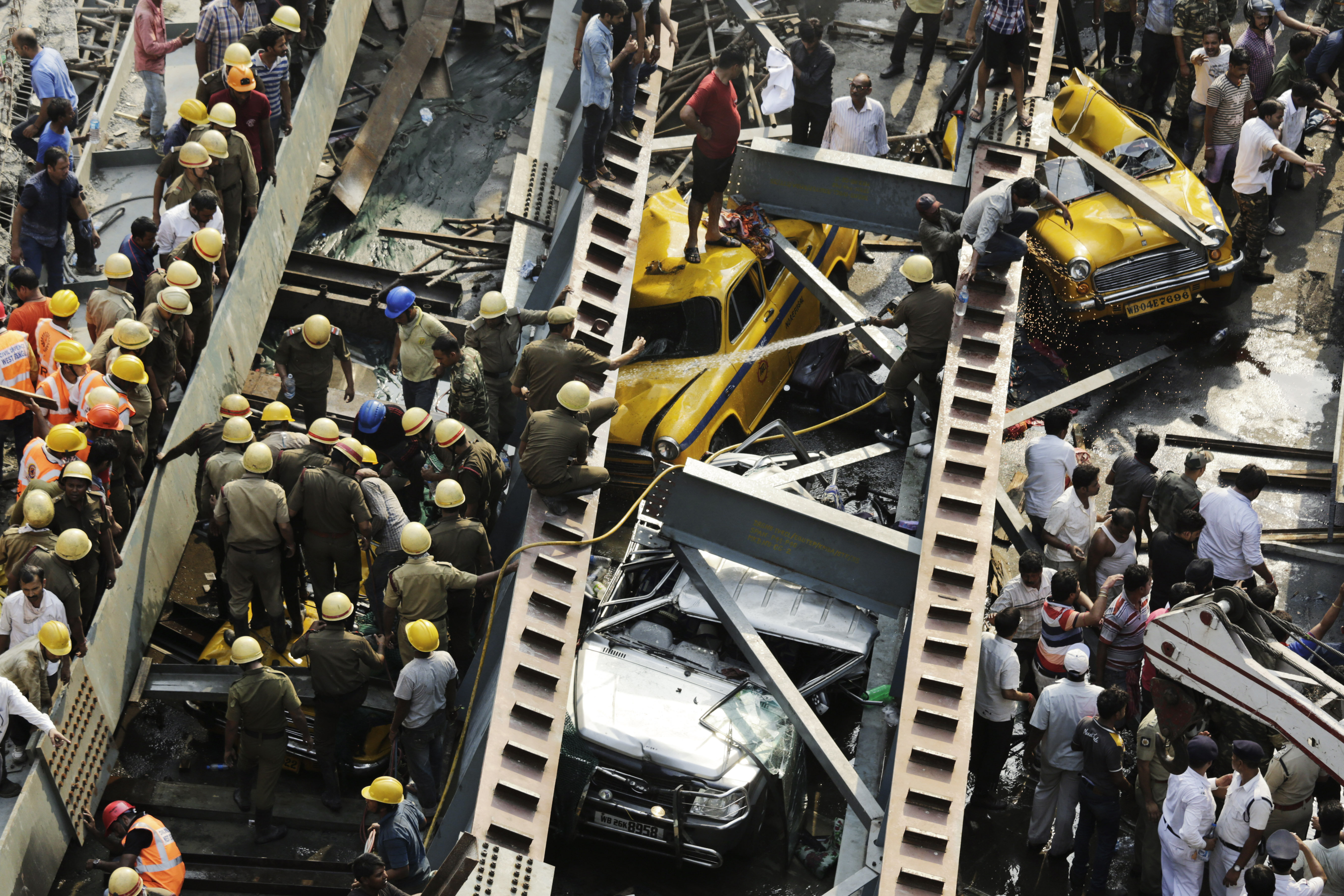
Tom:
ReplyDeleteYou should amble on over to the El Cerrito Recycling Center and meet some of the regulars. They have great free books there, and lots of nice packing paper and bubble-wrap. The serious scavengers work the electronics bin. Folks drop off used kitchen utensils and other unwanted paraphernalia, like old baby carriages. I'm just a book junkie, myself. Even Bob Hawley occasionally limps in for a visit.
It's, you know, "real" etc.
Great poem and homage to Byron, Tom. The world comes at us hard and fast . . .
ReplyDeleteThanks very much, Curtis and Hazen.
ReplyDeleteHazen, those were my thoughts exactly, every time I encountered Byron on one of his perilous shopping trips. He was on the street late at night for much the same reason I was. Trying to avoid the worst of rush hour. Traffic here is murderous. Neither Byron nor I could ever be anything but offensive clutter in the midst of the wild rush of the bigtime getters and spenders in their shiny expensive vehicles dashing up and down the hill, who get richer and more driven every year now, and are increasingly in a hurry, and who would have pedestrians banned from the streets altogether if they could, and who, given the way things are going, may well have their wish come true on that score, sooner rather than later, as the mayor and city council and other property traders see fit.
Directing Byron on his painful progress, by a combination of shouting (over traffic loud!) and forceful physical guidance, was pretty complicated, though at least with Byron, the normal B-Town smiley face (but do a deal later) brand of lying simply never happened. He was brusque and direct to the point of what would have been extreme rudeness in anybody else; this undoubtedly out of necessity, as he was and had been for a very long time completely alone in this ever more all too hard and fast world. Neighbours were scared of him. It was supposed (lazily, because the snooty creeps who live around here never want to know anything before judging it) that he was just another crazy homeless guy. But this was not the case. He was sufficiently compos mentis to have survived the streets of Berkeley totally on his lonesome. He had a home of sorts. He dwelt in a tiny sub-unit hid away around the back of the house of an elderly Chinese man. After Byron's death I talked briefly with the landlord, who was mystified as to Byron's motive in making that long difficult trip down the recycling center, when, in fact -- the Chinese man, whose English is poor, pointed at the recycling bin in front of the house -- there was no need; there are weekly pickups. But Byron was an extremely scrupulous fellow.
In any case, there can be no doubt he was headed to the recycling center, as it's just a block beyond the Gilman level crossing. And though it's an inconsequential detail, since I've now dared write this piece about a real person, I ought to make it clear Byron was not a book junkie, book fetishist, book dealer, or any of that, even though he lived in Berkeley (mirabile dictu). When in the end his few sad belongings were deposited in the street to be picked over by scavengers, the box of ancient dog-eared paperback works of "faith literature", surely acquired many years earlier, before he'd totally lost his sight (remember, Byron couldn't see six inches in front of his face, much less read books), were certainly of no value to anyone -- as proven by the fact that not even the busy junkpickers wanted them. I did notice that some sort of prehistoric machinery, possibly a braille typewriter, did occasion a brief disagreement among the scavengers, whose interest was plainly based in curiosity, as well as in the never absent prospect of turning some small profit. Anyhow, a day later, all trace of Byron was gone forever, and as the only persons I have ever met who recognized his humanity in any way -- some do gooders from a church group -- disappeared after that forlorn one-day excavation of his digs, I doubt he will ever be considered again, for as much as a moment, by anybody who lived here, so near and yet so far, all that very long time.
And BTW just for the record, Curtis, no big deal, but that EC recycling center with the well-known book exchange (where by the way I could not "amble" even were I to wish to do so, as, since being run over at the common corner where Byron and I so often crossed paths in the night, I haven't been able to amble anywhere, more like slowly shuffle along, on this same killer street) was NOT Byron's destination, on his final fatal junket. He was going in another direction altogether, west not north. His destination was the Berkeley recycling center on 2nd street, just across those sundering UP tracks. And of course he never got there. For me the saddest part of this whole terribly sad story is that Byron died in Highland, perhaps the saddest place in the world.
ReplyDeleteOh, and the local news-sheet kibitzer comments on the news item mentioning Byron's encounter with the UP -- it was reading these that got me to attempt my own two-bit obit -- may be of interest. I'll give a sample of comments on the dominant theme, a callous and cynical dehumanization of the victim based in the original common and hasty misconception (prejudice) re. those awful, awful homeless.
"Sounds like another homeless guy, from the large camp in the Gilman underpass. The police cleared it out once recently, but of course they came back within a day."
"...build road bridges at the crossings, a few new bike & pedestrian bridges, & better fences to keep winos, junkies & troubled teens off the tracks. It'd also be cheaper to efficiently house the homeless in vacant buildings than pay for all the ER visits, police & fire time, thefts, & homeless-industrial complex."
"Have to disagree about the last part because housing for the 1000 homeless here would attract 5000 more. So no, it's not cheaper. What would be cheaper is reducing services and being openly hostile. Then after 500 leave, the cost would be half."
"I partly agree; Berkeley's cushy reputation for non-enforcement & extra goodies (free pot!) already attracts vagrants from all over the US. Cleverly done, I think we can make it less nationally attractive & more locally humane at the same time."
"There actually is a 'thank god & Greyhound you're gone' program, providing a free bus ticket to some homeless people who agree to go back to the home town they got run out of, but it isn't widely known, promoted or used. SF has one too."
Surprisingly enough, there was also one gently corrective comment, yes, from a woman who'd actually known Byron a little bit. And I was grateful for that.
"I know this man, he is a blind man that I used to attend church with. He was just trying to get to the recycling center. Now he has lost his leg. Very sad, please pray for him. He is a good man."
"Something needs to be done to improve safety on Gilman street. He was not trespassing. He is a blind man."
I am happy God took Byron off this street, though I'd feel bad to learn that Byron, up there in heaven, had heard me saying that -- taking the name of the Big G in vain in this way. Our disagreement on the God issue, indeed, was a serious sticking-point, beyond which our streetcorner conversations could never go. My way was and is to make a joke out of God and everything, just in order to reduce the general terrible unbearable gravity of everything. Byron hated that. But everybody has their own way.
...And while we're on prejudices, and stories nobody wants to know about... I take it the latest cascade of b.s. from the Je Suis Brussels fount has pretty much convinced everybody who can watch TV that those annoying migrants and refugees from those bad, bad places in the Middle East have somehow learned their lesson and gone back to those bad, bad places they came from... like, you know, just more and more of those damned homeless, trying to get our great stuff... & c.
ReplyDeleteBut, uh, this just in: verbatim:
Greece on brink of chaos as refugees riot over forced return to Turkey
Rival ethnic groups clash in Piraeus and 800 break out of detention centre on Chios as EU deal brings desperation: Helena Smith in Athens for The Observer, Saturday 2 April 2016 14.57 EDT
The Greek government is bracing itself for violence ahead of the European Union implementing a landmark deal that, from Monday, will see Syrian refugees and migrants being deported back to Turkey en masse.
Rioting and rebellion by thousands of entrapped refugees across Greece has triggered mounting fears in Athens over the practicality of enforcing an agreement already marred by growing concerns over its legality. Islands have become flashpoints, with as many as 800 people breaking out of a detention centre on Chios on Friday.
“We are expecting violence. People in despair tend to be violent,” the leftist-led government’s migration spokesman, Giorgos Kyritsis, told the Observer. “The whole philosophy of the deal is to deter human trafficking [into Europe] from the Turkish coast, but it is going to be difficult and we are trying to use a soft approach. These are people have fled war. They are not criminals.”
Barely 24 hours ahead of the pact coming into force, it emerged that Frontex, the EU border agency, had not dispatched the appropriate personnel to oversee the operation. Eight Frontex boats will transport men, women and children, who are detained on Greek islands and have been selected for deportation, back across the Aegean following fast-track asylum hearings. But of the 2,300 officials the EU has promised to send Greece only 200 have so far arrived, Kyritsis admitted.
“We are still waiting for the legal experts and translators they said they would send,” he added. “Even Frontex personnel haven’t got here yet.” Humanitarian aid also earmarked for Greece had similarly been held up, with the result that the bankrupt country was managing the crisis – and continued refugee flows – on very limited funds from the state budget.
On Saturday overstretched resources were evident in the chaos on Chios where detainees, fearing imminent deportation, had not only run amok, breaking through razorwire enclosing a holding centre on the island, but in despair had marched on the town’s port. In the stampede three refugees were stabbed as riot police tried to control the crowds with stun guns and teargas. The camp, a former recycling factory, had been ransacked, with cabins and even fingerprint equipment smashed.
“This is what happens when you have 30 policemen guarding 1,600 refugees determined to get out,” said Benjamin Julian, an Icelandic volunteer speaking from the island. “I witnessed it all and I know that all the time they were chanting ‘freedom, freedom, freedom’ and ‘no Torkia, no Torkia’. That is what they want and are determined to get.”
[Helena Smith in Athens for the Observer, continues:]
ReplyDeleteIn the mayhem that had ensued, panic-stricken local authorities had been forced to divert the daily ferry connecting the island with the mainland for fear it would be stormed.
Similar outbreaks of violence had also occurred in Piraeus, Athens’ port city, where eight young men had been taken to hospital after riots erupted between rival ethnic groups on Wednesday.
With tensions on the rise in Lesbos, the Aegean island that has borne the brunt of the flows, and in Idomeni on the Greek-Macedonia frontier where around 11,000 have massed since the border’s closure, NGOs warned of a timebomb in the making. Hopes of numbers decreasing following the announcement of the EU-Turkey deal have been dispelled by a renewed surge in arrivals with the onset of spring.
Official figures showed that 52,147 refugees and migrants were stranded in the country at the weekend, with 6,129 registered on Aegean islands that had been almost completely evacuated after the accord was reached on 20 March.. Last year, more than 1.1 million irregular migrants streamed into Europe with over 850,000 pouring into the continent through Greece.
Pleas from Athens to fellow EU member states to reopen the Balkan route have fallen on deaf ears.
listening
ReplyDeleteBy the by, as tinytown local matters have been touched upon here... I mean re. that El Cerrito "recycling" Book Exchange -- that is, the place Byron definitely was NOT headed for, when the train hit him -- and its minor fame (petty notoriety) as a "prospect" mart for industrious do-a-dealing book scouts... there's this:
ReplyDeleteBook Exchange Rules in Flux at Recycling Center
Familiar complaints about aggressive book-sellers hogging the free books and intimidating other people were aired at a small community meeting Wednesday at the interim Book Exchange at the El Cerrito Recycling Center: Charles Burress, El Cerrito Patch, 12 February 2012
The dominant sentiment at the popular Book Exchange at the El Cerrito Recycling Center was that something should be done to stop greedy book-sellers who grab large numbers of the best books to resell and who intimidate other patrons seeking volumes for their personal reading pleasure.
The city, which is inviting public input on a set of draft rules to foster mutual respect and equal access for all users of the Book Exchange, convened a community meeting Wednesday afternoon that drew 17 members of the public.
"I'm one who stopped using it because I got turned off by aggressive people," said one woman who came to the meeting...
The city posted a set of rules at the interim Book Exchange several months ago, saying, for example, “SHARE ACCESS to new donations – do not monopolize.” The rules, however, gradually disappeared because they were attached to the part of a canvas canopy that was rolled up...
The woman who said she had stopped using the Book Exchange also said she was dubious that such rules telling people to share and be nice would solve the problem.
Another woman asked, "How do you police people who don't have common decency?"
A man asked, "It is it a readers' community, or it is a book-sellers' access?"
And finally, as to Byron's fate, today I hobbled round his former entryway to see if his mail had been picked up. It hadn't, and was piling up. Doubtless mostly junk mail (what other kind is there any more), but still, just saying... and as I was poking about, I noticed two big shiny newish cars parked outside, and then saw, in Byron's former doorway, two young Chinese persons, a young woman cutting a young man's hair, with a towel, bowl and scissors, yet... they were, naturally, somewhat startled... and were equipped with little to no English.
ReplyDeleteI tried to explain, mentioning, in hopefully not too rude a way, that I had known Byron, and that Byron is now dead...
This later fact evinced great surprise, once I had got it across.
Then it hit me: moving new people in before the old ghost was out, where's the surprise, wonder how much the rent has already gone up on that squalid little basement hovel, here in the middle of the costliest real estate market on earth.
(And, well... here it is saturday night on earth, again... hi, Vincent!)
Hi, Tom.
ReplyDeleteI wish more people were like you.
Not all of them, of course.
Heh.
This whole post of yours is apropos re:
(oh never mind)
"Saturday night on earth, again"
That's a nice line.